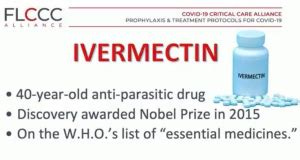WHO Finally Reports On "Equitable Access" to THERAPEUTICS!
On September 22, 2022 The WHO Issued A Document On How The equitable roll-out of COVID-19 diagnostics and therapeutics continues to be inadequate and threatens to undo public health gains achieved.
EQUITABLE ACCESS TO THERAPEUTICS?
Did the World Health Organization Just Admit Therapeutics Are Critical To Health Responses, But Are Being Withheld?
Looks like it.
Some excerpts:
This report’s central premise is that diagnostics and therapeutics, and associated test to treat strategies, are fundamental components of the pandemic response, both for COVID-19 and for future health threats. Addressing this is as much a structural problem as a technical one: diagnostics and therapeutics are often considered different markets with independent stakeholders. But integration of diagnostics and therapeutics including test to treat strategies in primary health care systems, along with vaccines and public health measures, is a core part of pandemic response. Two and a half years into the COVID-19 pandemic, this report reflects on the main challenges and key solutions on the road to equitable access to diagnostics and therapeutics.
Our Approach
This report draws from experience gained through the Access to COVID-19 Tools (ACT) Accelerator Diagnostics and Therapeutics pillars, and also includes the perspectives of collaborating stakeholders (countries, civil society representatives and the private sector). To ensure a consistent analysis, each pillar evaluated
- as of July/August 2022 - the state of play across three areas:
regulation, manufacturing and supply;
sustainable markets and demand; and
in-country delivery and health system approaches.
Equitable access and effective uptake of tests and treatments are complex issues. For both diagnostics and therapeutics, recurring challenges have been identified:
Regulation: slow or incomplete at global level, regional level and in countries.
Manufacturing: highly concentrated in a few countries and manufacturers, with variable diagnostic product quality.
Allocation: lack of volumes reserved for low- and middle-income countries, including upper-middle income countries (UMICs).
Funding: delays in mobilizing funds in a timely manner, and scarce and uncertain funding for development of medical countermeasures, with vaccines receiving most attention and funding.
Access & Deployment: global, regional and national efforts to promote equitable access to medical countermeasures have had variable implementation and accountability. This has not resulted in equitable or affordable access.
Forecasting: dynamic and unpredictable nature of the pandemic has led to challenges in demand forecasting. Determinants of local demand and fragmented international response have hindered efficient planning.
Demand: evidence suggests diagnostics and therapeutics continue to be crucial for those at highest risk of progression to severe disease, but awareness and demand remain low.
Building on these findings, this report proposes sixteen recommended actions to address what have been identified as key structural challenges and specifies a potential owner for each action. The report offers a potential high-level roadmap of where efforts should be concentrated to support country-level decision- making.
The recommended actions follow two different time frames:
• Six recommended actions are in the context of the six-month ACT-A plan (October 2022 to March 2023). These actions are relevant during the next period of the ACT-Accelerator’s work and thus focus on the downstream part of the value chain. It is recommended that the ACT-Accelerator Tracking and Accelerating Progress Working Group - or the mechanism that will continue to track and monitor ACT-A's work - together with the G20 & G7 health track, review the implementation of the recommended actions.
• Ten recommended actions are made in the context of long-term COVID-19 control and the broader Pandemic Prevention Preparedness and Response (PPR) agenda. Therefore, these actions span across the value chain (upstream and downstream).
This report’s long-term recommendations consider ongoing proposals to strengthen the Global Health Architecture, as identified in the WHO White Paper and the G20 health track, as well as the new Financial Intermediary Fund (FIF) for pandemic prevention preparedness and response and the Pact for Pandemic Readiness launched by the German G7 Presidency, which will help ensure the world is better prepared for future pandemics.
ACT-A Therapeutics Pillar
At the onset of the COVID-19 pandemic, little was known about effective therapeutic options for COVID-19. However, their promise and potential to transform outcomes related to the disease meant it was essential to take a coordinated approach
to accelerating discovery, access and uptake of therapeutics. This resulted in the formation of the ACT-A Therapeutics Pillar, as part of the wider ACT- Accelerator partnership. ACT-A Therapeutics Pillar is co-convened by Wellcome, Unitaid and the Global Fund with WHO, and other ACT-A agencies, including UNICEF.
The ACT-A Therapeutics Pillar has several broad objectives. These objectives include advancing the COVID-19 therapeutic pipeline, securing meaningful, global, equitable access to priority treatments, and facilitating the introduction and scale-up of treatments in LMICs. The work of the pillar and its partners has brought about several key achievements in the supply of, and access to, COVID-19 therapeutics, including the introduction of oral antivirals for treatment of mild and /moderate cases. However, as the therapeutics landscape has changed, the work of the Pillar has had to evolve and adapt to continue to drive equitable access to therapeutics.
Before therapeutics were available, the Therapeutics Pillar worked to advance the pipeline of potential treatments. The COVID-19 Therapeutics Accelerator is one example of an initiative that played a key role in advancing the R&D portfolio for COVID-19 therapeutics by providing quick, flexible, and targeted funding and technical assistance. As promising therapeutics emerged from the pipeline, the pillar worked and continues to work to secure equitable access for LMICs. An excellent example of a therapeutic class the Pillar has helped to support are oral antivirals for COVID-19. The development, guideline adoption and regulatory approval of these antivirals was a major milestone in the therapeutic landscape. It has enabled outpatient treatment of COVID-19 and can help to prevent hospitalization and save the lives of patients most at risk of developing severe COVID-19.5
If any of you readers happen to go through this document please post your interpretation below. We just saw it and wanted to share so you all can dissect its meaning and hopefully share any insight with us as we prepare to SUE THE WHO.
We will have time to review it tomorrow, and yes we will RAISE HELL to the WHO for this late in the game attempt to redeem themselves, but upon skimming the document, it appears EVERYTHING BOILS DOWN TO FUNDING - looks like a document to drive more funding and big Pharma alliances to control therapeutics.
It almost appears to be a confession that vaccines were over funded and no-one attempted to fund therapeutics within the WHO control system (except the couple that were funded and approved - likely to great profit for the funders) …
WHO is Responsible?
No, seriously, The WHO is absolutely responsible.
The WHO is not ensuring the equitable access of ACTUALLY effective therapeutics and going out of their way to ensure the overfunding of failing non vaccine genetic experiment injections that compound the problem of transmission, cause death and health problems on an unprecedented scale, which is unconscionable and criminal.
The WHO wants to inequitably demonize certain unprofitable therapeutics whilst cheerleading the approval of certain profitable antivirals.
All we know is there is a much better ring to the slogan “equitable access to therapeutics” vs. the not so appealing “ equitable access to vaccines”… Just saying.
If you appreciate our valiant efforts to confront and try to stop tyranny in Costa Rica and within the FDA and WHO et al, please consider supporting us with a single or recurring donation to continue to do this tedious but critical work if you are able.
IOJ team really needs your help to take on the biggest problems on earth with real actions not talk.
Why be the resistance when you can be the PERSISTENCE?
Stay tuned for the next exciting sagas and please share our work so others can know whats going on!






